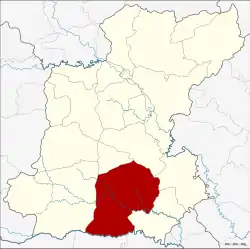Suwannaphum District
Suwannaphum (Thai: สุวรรณภูมิ, pronounced [sù.wān.nā.pʰūːm]) is a district (amphoe) of Roi Et Province, in eastern Thailand. Named after the legendary country of Suwannaphum, which according to Thai tradition was on the Chao Phraya plain. It was the seat of a small Lao mandala kingdom until the Laotian Rebellion of 1826-1829 ended vestiges of Lao independence west of the Mekong.
Suwannaphum
สุวรรณภูมิ | |
|---|---|
 District location in Roi Et Province | |
| Coordinates: 15°36′33″N 103°48′1″E | |
| Country | Thailand |
| Province | Roi Et |
| Seat | Sa Khu |
| Area | |
| • Total | 1,107.042 km2 (427.431 sq mi) |
| Population (2008) | |
| • Total | 116,917 |
| • Density | 105.6/km2 (274/sq mi) |
| Time zone | UTC+7 (ICT) |
| Postal code | 45130 |
| Geocode | 4511 |
History
In 1718, the first Lao muang in the Chi valley—and indeed anywhere in the interior of the Khorat Plateau—was founded as Suwannaphum (in latter-day Roi Et Province) by an official in the service of King Nokasad of the Kingdom of Champasak, leading some 3,000 subjects.[1]
Geography
The district is in southern Roi Et Province. Neighboring districts are (from the west clockwise): Kaset Wisai, Mueang Suang, At Samat, Phanom Phrai, Nong Hi, and Moei Wadi of Roi Et Province, and Rattanaburi and Tha Tum of Surin Province.
Administration
The district is divided into 15 sub-districts (tambons), which are further subdivided into 195 villages (mubans). Suwannaphum itself has township (thesaban tambon) status and covers part of tambon Sa Khu. Each of the tambons is administered by a tambon administrative organization.
| No. | Name | Thai | Villages | Pop.[2] |
|---|---|---|---|---|
| 1. | Sa Khu | สระคู | 21 | 20,956 |
| 2. | Dok Mai | ดอกไม้ | 14 | 6,105 |
| 3. | Na Yai | นาใหญ่ | 15 | 8,073 |
| 4. | Hin Kong | หินกอง | 16 | 9,319 |
| 5. | Mueang Thung | เมืองทุ่ง | 8 | 5,118 |
| 6. | Hua Thon | หัวโทน | 12 | 5,396 |
| 7. | Bo Phan Khan | บ่อพันขัน | 9 | 4,540 |
| 8. | Thung Luang | ทุ่งหลวง | 14 | 7,965 |
| 9. | Hua Chang | หัวช้าง | 12 | 6,299 |
| 10. | Nam Kham | น้ำคำ | 15 | 9,610 |
| 11. | Huai Hin Lat | ห้วยหินลาด | 12 | 5,473 |
| 12. | Chang Phueak | ช้างเผือก | 11 | 6,942 |
| 13. | Thung Kula | ทุ่งกุลา | 13 | 7,080 |
| 14. | Thung Si Mueang | ทุ่งศรีเมือง | 11 | 7,310 |
| 15. | Champa Khan | จำปาขัน | 12 | 6,731 |
References
- Brow, James (1976), "Population, land and structural change in Sri Lanka and Thailand", Contributions to Asian studies, Kogan Page, Ltd (9): 47, ISBN 90-04-04529-5
- "Population statistics 2008". Department of Provincial Administration.
External links
- amphoe.com (Thai)